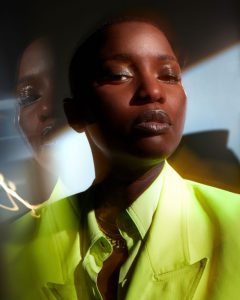 On her third album, Poupée russe (Russian Martryosha dolls), Sarahmée follows through on her ideas with lyrics that carry a “more lucid” message.
On her third album, Poupée russe (Russian Martryosha dolls), Sarahmée follows through on her ideas with lyrics that carry a “more lucid” message.
Over the course of 13 songs, the Québec-based rapper draws a very rich picture of what makes her heart, but also her mind and her gut, tick. Her writing is straightforward and direct, and she bites into her words with just the right amount of aggression, sensitivity, and arrogance commanded by each song.
Her lively, heartfelt delivery is a reflection of the singer-songwriter’s highly organic creative process. “I let go of my phone and went back to the good old pen and paper,” she says proudly. “It’d been a while since I last went back to my good ol’ habits. Writing, I mean actually writing and crossing stuff out, allowed me to take a step back from my lyrics. It allowed me to visualize the music, to be more structured and to express my ideas more clearly. I’m so ADD when I’m on my phone, but when I’m sitting down with a piece of paper, my ideas germinate longer.”
Active of Québec’s rap scene for over a decade now, Sarahmée slams her fist on the table with her third offering. “I’ve had to grow a little harder over time,” she raps on “Quand la route est longue,” clearly signalling that she no longer has any time to waste, career-wise as well as life-wise. “I figured if I don’t take the place I deserve with this album, no one else is going to give it to me. I’m the conductor of my own train,” she says.
And that “place” designates the status she rightly deserves on Québec’s male-dominated rap scene. On “Elle est partie,” a song denouncing the many layers of sexism that surround us, she throws a few punches at local rap figures who have “too much ego to say that a woman is their colleague.”
That type of line is a perfect reflection of the aplomb that permeates Poupée russe. “It’s time to shoot what I have to say now that I have people’s attention,” Sarahmée says adamantly. “No one was expecting Irréversible [her second album released in 2019], whereas now, I could tell there was an audience ready to listen.”
Using her microphone as a megaphone, the rapper dives into hot topics such as systemic racism and police brutality. “As a young woman who’s also black, I’m afraid of the police,”, she raps on the title song before defiantly adding “you’re either an ally or you’re their accomplice,”, a clear call to join the Black Lives Matter movement.
“I’m aware that not everyone is comfortable taking a stance,” she nuances. “I’m not afraid of speaking out, and I’m constantly thinking about all that, but that doesn’t mean I’m not careful about what I do say. I don’t want to be a spokesperson for all social groups. I’m only Sarahmée, and no one elected me to speak on their behalf. In other words, time has also taught me to shut up.”
Hence her decision to express her political views in her music rather than the media, as she did last year. “At some point, I said to myself, ‘I’m not a commentator [who is only invited to comment] on racism!’ I was starting to feel like I didn’t really have any business there.” So, instead of accepting all the invitations that were extended to her, Sarahmée decided to take time for herself. That perspective allowed her to write such brilliant songs, some of which are particularly intimate.
One such example is “Partir plus tôt,” a song that tackles her addiction problem head-on. “It’s an autobiographical song about what happened to me after Irréversible. It was a beautiful year, but also an incredibly difficult year. It was pretty bad towards the end,” she confides. “I had to make a decision: regaining control over my own life. I went into rehab and put in the work that saved me. And that taught me a lot of things. Simple things, such as the fact that you don’t absolutely have to get completely wasted when you go to a party. I’m thankful I made that decision, because my addiction was starting to impact a lot of other stuff, especially my music, my work ethic, my team… It had to stop.”
With its vibrant and dramatic strings, “Partir plus tôt” is in stark contrast with the rest of the album’s musical direction. Alongside her loyal allies Tom Lapointe and Diego Montenero, the two producers at the core of her team, Sarahmée put together an album with a fiery trap and Afropop vibe, while in a creative retreat in a cabin in November of 2020.
“This time around, I didn’t feel like writing 50,000 songs to select just a dozen. I hate that!” she says, referring to the heavier process that drove Irréversible. “The guys put a ton of energy in the productions, so I had a big challenge in front of me. My lyrics had to live up to that!”
She clearly nailed that mission thanks, to clearer-than-ever ideas, and a freer-than-ever mind.